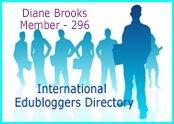Wednesday, November 30, 2011
Marking v computer data
Sunday, November 13, 2011
ICT in schools
Although some research by Lally and Macleod (1984) suggested that computer aided instruction types of programs had limited use due to applications not leading to improved teaching procedures but merely computerising existing techniques, many still believe this process will work.
In order for ICT to be integrated into the curriculum Yelland (2001) states that changes in the learning process occurs which are characterised by (CEO forum 1999):
Problem or project oriented – whereby investigations are authentic and where there are many solutions to the problem
Student centred – students feel empowered by their work and participate in developing their own investigations. Teachers act as guides, facilitators, and provide the materials to support their learning. While teachers remain the cornerstone of the educational process a partnerships is formed with students, parents, peers and other professionals. The teachers’ role is less authoritarian and more one of encouraging and guiding the students towards their goals.
Collaborative – since learning with authentic tasks is an interactive experience between teaches and students and as students acquire and use information they need to exchange ideas and create relationships with each other and with professionals relevant to their work
Relevant – learning with ICT has the potential to create educational opportunities to meet the needs of individuals and groups in diverse ways and allows them to work according to their needs and interests. Teachers can use digital devices to record and report on students’ performance in enhanced ways, tracking achievement through databases or using video for observation of skill development.
Productive – the use of ICT encourages both teachers and students to become ‘content producers’
The characteristics of exemplary teachers who integrated computers into their classrooms as found by Becker (1993) included that they created an environment for learning in which the computer directly related to the curriculum goals as well as incorporating a wide for variety of uses which were relevant to knowledge building across the curriculum. These teachers also had greater access to formal professional development and also had smaller class sizes. In this work Becker states that his ‘assumption of the exemplary teaching label was based on the important academic outcomes which result from systematic and frequent use of computer software for activities which involve higher order thinking, such as interpreting data, reasoning, writing, solving real world problems and conducting scientific investigations (p. 316).
Another study by Swan & Mitrani (1993) found that many studies that had been conducted concentrated on how the computer reinforced or enhanced basic skills and measured by testing outcomes in standardised tests. Another point that they made was that many studies found that when such skills were presented on the computer that they were learned more effectively. However they maintained that such use of computers was detrimental to a broader use which would impact on the actual processes of teaching and learning. They maintain that when computers are effectively integrated into the curriculum and are a natural part of the teaching process that the learning is more student-centred and collaborative than in the more traditional classroom settings. In this setting they found that the dynamics between the teacher and students changed with the teacher taking a facilitators role. From this work they stated that ‘technology alone will not change schools’ as they felt that there also needs to be a change in the classroom climate and pedagogy for the use of ICT to have an impact.
Saturday, November 12, 2011
Model for professional development for teachers in the online learning environment
The advent of the internet has changed the mode of delivery for many courses in the tertiary sector and courses are now offered in an online learning environment with variable success. There has been a range of studies concerning online learning in such environments as university classes online, however there is little research about the role of information technologies in promoting professional learning for teaching practitioners.
Educational practitioners undertake professional development to either develop their skills and knowledge to improve student learning in their classrooms or for promotional reasons. Educational practitioners want to be inspired by their teachers when undertaking professional development. Some researchers point to the relationship between the teacher and the course members as being an important factor in the success of a course. As many professional development courses are being delivered in an online learning environment, the course members never meet the teacher and the teacher needs to develop strategies to allow these relationships to develop. posted online using the resources from a face-to-face course for the course members to download. Now the capabilities of the internet allow for a range of technologies to be used to enhance the learning in an online learning environment.
The aim of my study was to explore the perceptions of educational practitioners who are undertaking an online professional development course.
My study suggests that a pedagogical shift for teaching practitioners can be accomplished in the online learning environment through the online environment design and the teacher taking an active role in the facilitating.

Using the findings from this study, a model for the online learning environment to encourage teaching practitioners to integrate the skills and knowledge into their classrooms to enhance the children’s learning is shown. This model involves a cyclic approach and involves developing skills and knowledge in educational contexts, linking these to relevant theory and reflection on the learning, completing a range of tasks in the course member’s own context, and completing assignments using the skills and knowledge in a classroom setting to enable the course member to see a technology infused classroom in practice. Seeing a lesson where technology is used and seeing the impact that the technology can have on student learning encourages teaching practitioners to employ technology-enhanced teaching strategies. This model aligns with Timperley et al. (2007) who suggest three stages in professional learning processes: cueing and retrieving prior knowledge, becoming aware of new information/skills and integrating them into current values and beliefs system, and creating dissonance with current position.
Timperley, H., Wilson, A., Barrar, H. & Fung,
Friday, November 11, 2011
The Ready Classroom

The Ready Classroom
The Ready Classroom is a great resource for teachers to use with their classrooms. Although it has been specifically written for schools in the USA all of the content is appropriate to schools everywhere.
This resource is to prepare schools, students and families in the case of a disaster.
Disasters that are dealt with on the site are:
- Earthquakes
- Extreme heat
- Floods
- Hurricanes
- Landslide and debris flow
- Thunderstorms
- Tornadoes
- Tsunamis
- Volcanoes
- Wildfires
- Winter storms and extreme cold
There are also links to appropriate videos which open in a new window. These vary in length and have been graded as to what is appropriate for different class levels.
My city has been through two major earthquakes over this past year. Naturally I therefore had a look through the area about earthquakes. In here is an explanation of what an earthquake is, a checklist to download and all the videos about earthquakes. While the checklist is good it does not deal at all with liquefaction which we found a real problem. At the time of the earthquake many cars got stranded in deep sink holes.
There are teacher tools including lesson plans, themed puzzles and resources. In addition children can make a family plan for emergencies. This is online and is not saved but may be printed out and some parts may be downloaded and saved. This would be well worth doing with students.
The Ready Classroom is part of the Discovery Education web site.
Guest post
Education and Technology - Welcome a Unifying Approach Leading to Better Learning
Education and technology - will it be able to incorporate a better learning experience among the youth? Well, the debate over whether the blend of education and technology will be able to formulate productive learning might still be continuing, but the integration of tech-based learning that has already crept in the educational world cannot be missed. The influence and dominance of technology in our living, learning, and working has reached such heights that you are open to either loving or hating it but certainly, not ignoring it. The integration of tech-based learning however, has opened multiple doors of opportunities for the career-oriented individuals.
Now, assuming that you wish to advance your career with an MBA degree, but is tied by other personal and /or professional commitments. To add to the blues, your dream was to obtain a degree from a foreign university of recognition. Leaving your job and moving out to pursue the degree through regular studies is certainly not a choice; therefore, what stands as an option for you. Well, the options until a decade back were tied to enrolling for part time program, weekend classes, and correspondence courses, if not regular course. Establishing a digital communication was impossible then, but forward to the present age, living your dream is no longer far away.
You can well consider pursuing a distance learning MBA program to realize your dream; thanks to the magical touch of technological influence over learning. Establishing a communication and sharing information in this age of web dominant technologies is no longer a challenging task. By virtue of technological advancements, distance learning has crept into the digital world in the name of online learning or e-learning. The introduction of learning in the digital world on strength of technology has certainly made living and learning easier than ever before.
Students are now open to connecting and communicating with their instructors anytime and anywhere independent of time and distance gaps. The strong bond of education and technology has made it easier for the mid-career professionals and the newcomers to eye for success in the global job market through distance learning MBA program. While a mid- career professional can conveniently enroll in online classes for upgrading his skills to offer better productivity in the job sector, the students can purse the management course alongside their traditional programs for a better stand individually in the corporate world.
The introduction and advancement of tech-based learning has opened multiple avenues for the career-oriented individuals, as they are now able to pursue a degree course at their own convenience without shifting base or compromising on their respective commitments. Since, the competition is strict leveraging one’s skills in the given professional filed has become essential to survive through the odds of the current job market. Here, is a quick look at some of the applications that has made the blend of education and technology productive for many around the world –
- Discussion Boards
- Online Chat Forums
- Video and live conferencing
- Podcasts, webcasts, and vidcasts
- Other Internet communication tools
Distance learning MBA on strength of technology has created a road that enables the career-oriented individuals to match pace with global corporate world that is developing with rapid speed and swiftness. Education and technology, the blend has certainly come across as a blessing for the learners wishing to carve a niche professionally.
To learn more about the blend, you can refer to the BBC report on “Digital textbooks open a new chapter” that detail on the initiative taken by educational institutes to digitalize learning.
AUTHOR BIO - Freya Spears driven by his passion towards writing likes to create thought provoking blogs and write-ups related to the educational world that is ever changing in this rapidly developing age. Here, he focuses upon distance learning MBA and the way technology integration in education has simplified the career objective.

 Web site: http://ictineducation.webege.com/
Web site: http://ictineducation.webege.com/









